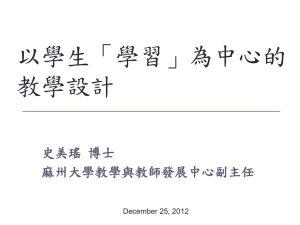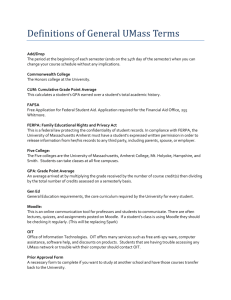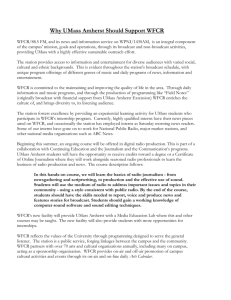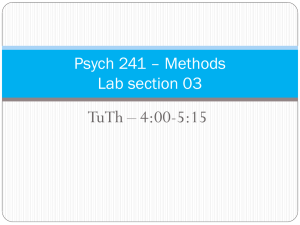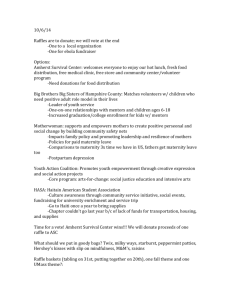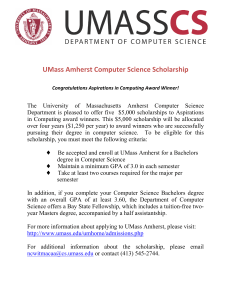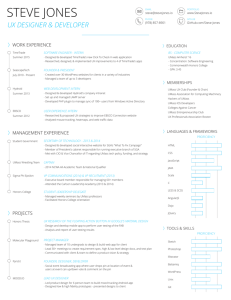University of Massachusetts Dartmouth Strategic Plan for Information
advertisement
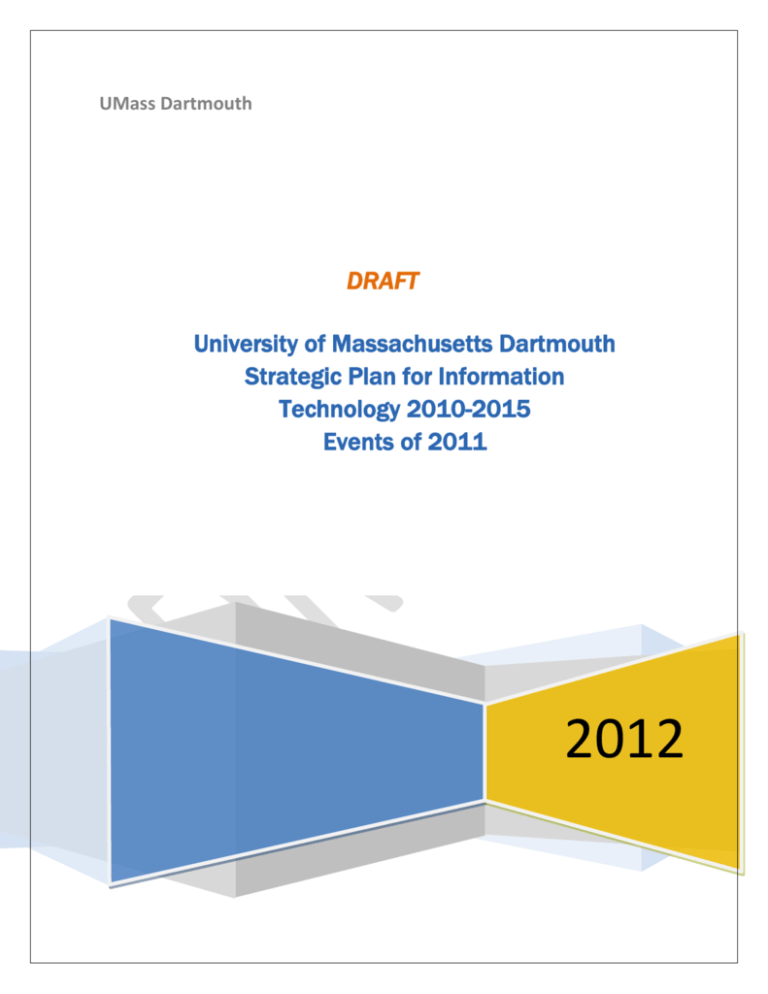
UMass Dartmouth DRAFT University of Massachusetts Dartmouth Strategic Plan for Information Technology 2010-2015 Events of 2011 2012 Table of Contents Executive Summary Page 3 Planning Process Update Page 5 Goals, Objectives and Implementation Strategies Page 2 Instruction Page 6 Research Page 13 Service Page 18 IT Infrastructure and Fiscal Planning Page 23 IT Strategic Plan Update - Events of 2011 v3.4 March 2012 Executive Summary The University of Massachusetts Dartmouth Strategic Plan for Information Technology 20102015 initiated an IT planning process to be marked by annual updates thus creating a sustainable plan. The Plan was developed with the following guiding principles: 1) The Plan must be linked to the UMass Dartmouth Strategic Plan. 2) The Plan must be sustainable and updated annually. 3) The IT Planning Council must be representative of the campus community. 4) IT planning must be coordinated with the UMass President's Office. The vision statement for the UMass Dartmouth IT Plan maintains that there will be "an open, secure, integrated, state-of-the-art IT environment. It will be supported by an accessible, adaptable, reliable and sustainable IT infrastructure and IT services that support excellence in teaching, scholarship, and service." 2011 Update UMass Dartmouth Based on the Recommendations in the IT Plan, there was a significant emphasis on the mobile campus. A Mobile Computing Initiative was established to bring a collaborative focus for implementation of UMassD Mobile. UMassD Mobile was created to address provide a mobile presence because of increase usage of mobile devices. There was a significant investment in IT infrastructure to promote more accessibility via wireless with a second WiMAX base station installed in the spring 2011. The wireless footprint is augmented to create a safer campus with wireless installed in police cruisers. There was an increase of bandwidth to meet the substantial increase in internet use of the residential population as well as an investment to increase storage and processing capacity to launch the Virtual Computer Lab (VCL) February 2012. In the summer 2011, the High Performance Computer Cluster was installed in the UMass Dartmouth Data Center to support research in Physics, Engineering, Math, and SMAST. As of December 2011, UMass Dartmouth has developed three undergraduate online degree completion programs (Liberal Arts; Women’s Studies; RN-BS); two undergraduate certificates (Women’s Studies; Sustainability Studies); six graduate certificates (Business Foundations; International Business; Organizational Leaders; Sustainable Development; Environmental Policy; Educational Policy); and, a Masters (Public Policy). The campus also offers two blended undergraduate degree programs via the Cape Cod campus in Liberal Arts and Business. UMass System In 2011, the Board of Trustees established a Subcommittee to examine IT efficiencies across all 5 campuses of the University and the President's Office. The subcommittee engaged Huron Page 3 IT Strategic Plan Update - Events of 2011 v3.4 March 2012 Consulting to examine efficiencies that included the establishment of an IT governance structure and a recommendation for possible business cases that could improve IT efficiencies. The process included visits to the campuses and several meetings with the UMass CIOs and CFOs. In the Fall 2011, the President formed the University IT Steering Committee composed of the members from the campuses and the President's Office and is chaired by Chancellor Collins from UMass Medical in Worcester. The UMass Dartmouth representatives are Deb McLaughlin, COO and Vice Chancellor for Administration and Finance, and Donna Massano, CIO and Associate Vice Chancellor for Information Technology. The Committee charter was endorsed at the December 2011 meeting as follows: The University IT Steering Committee Operational is established as the University’s highest level Information Technology committee. As such this committee is empowered and entrusted to: • • • • Page 4 provide a means for collaborative decision making and coordinated implementation in the pursuit of strategic services and needs that are common to campuses and the University as a whole identify common services that can be provided effectively and efficiently through shared arrangements, ultimately reducing redundancy and costs assess how specific IT investments support University and Campus strategic and operational goals determine University-wide IT strategic priorities, and pursue related resource requirements IT Strategic Plan Update - Events of 2011 v3.4 March 2012 Planning Process IT Planning Council Meetings and Campus Review The IT Planning Council met in the Spring 2011 and there was an update on IT initiatives as related to the Plan. In keeping with the process used for the development of the Plan, the IT Planning Council Wiki was used thus making the Spring 2011 meeting PowerPoint available on to those unable to attend. The IT Planning Wiki can be viewed at http://itplanning.umassd.wikispaces.net/. Initially, the IT Planning Council established a meeting schedule once a semester. It became apparent that it is more feasible to have one or more meetings during the Spring semester to sustain the planning process. Spring Meeting: 1) Reconstitute the IT Planning Council 2) Review current IT projects and initiatives encompassed in the IT Plan and other IT projects initiated during the year. The following communication sequence is used to inform the UMass Dartmouth Community of the IT Plan update: 1) Chancellor and Vice Chancellors; 2) Senior Leadership - Deans, Associate Provosts, Associate Vice Chancellors, Assistant Vice Chancellors; 3) Faculty Senate; 4) Student Senate; 5) Campus Community. IT Planning Council Membership 2011, 2012 Magali Carrera, Associate Provost for Undergraduate Studies Geoffrey Cowles, Assistant Professor, Fisheries and Oceanography/SMAST Cynthia Cummings, Assistant Vice Chancellor for Student Affairs Allison Cywin, Curator, Visual Resources Center/CVPA Andrew Darling, Director of IT Infrastructure/CITS Peggy Dias, Executive Director IT Service Assurance/CITS Salvatore Filardi, Associate Vice Chancellor for Administrative and Fiscal Services/Facilities Alex Fowler, Associate Provost for Graduate Studies Joy Hadley, Associate Vice Chancellor of Professional and Continuing Education Carolyn Hamel, Assistant Vice Chancellor for IT Systems and Planning John Hoey, Assistant Chancellor of Public Relations William Hogan, Dean, College of Arts and Sciences Donna Massano, CIO and Associate Vice Chancellor for Information Technology, Facilitator Charles McNeil, Systems & Digital Services Librarian/ Library Systems and Digital Services William Mitchell, Associate Vice Chancellor Administrative and Fiscal Services/Finance Grant O’Rielly, Associate Professor of Physics, Faculty Senate Representative Robert Peck, Dean, College of Engineering David Prairie, Student Senate (2012-); Sloan Piva, Student Senate (2011); Andrew Staples, Student Senate (2010) Jennette Riley, Academic Director of Online Education, Chairperson and Professor of English Douglas Roscoe (2012- ), Associate Professor of Political Science, Director of University Studies Tracey Russo, Director of Instructional Technology Marilyn Scudellari-Presto (2012- ), Budget Director Tammy Silva, Director of Institutional Research Wendy Skinner, Assistant Vice Chancellor for Corporate and Foundation Relations Robert Solis, Associate Vice President of Information Technology and CIO, President’s Office Page 5 IT Strategic Plan Update - Events of 2011 v3.4 March 2012 Strategic Goals, Objectives and Implementation Strategies The Strategic Goals, Objectives and Implementation Strategies for the following areas: 1) Instruction, 2) Research, 3) Service, and 4) IT Infrastructure and Fiscal Planning were established as key areas of focus. Below is an itemized update as to steps taken during 2011. 1. Instruction Strategic Goal Use IT in support of state of the art delivery and assessment of teaching and learning to create “excellent undergraduate and graduate programs that prepare students for advancement in the twenty-first century environment”. Strategic Objectives and Implementation Strategies 1.1 Expand Online Courses and Programs Expansion of online course offerings and programs requires a coordinated effort between administration and course development. IT can play a significant role in planning and executing the necessary changes. UMass Dartmouth has developed fewer online courses and programs as compared to other UMass campuses. One of the intentions of this objective is to improve access to education for nontraditional students. Furthermore, there is the possibility of significant revenue generation via online courses and programs. 1.1.1 Evolve and grow UMass Dartmouth support for a comprehensive, next generation Learning Management System and continue to work with UMass Online on its development strategy. 2011 Update: Faculty use of the learning management system for web-enhanced, blended and fully online courses continues to grow. Workshops and training sessions are offered throughout the year in support of the LMS. Training offered (includes both Getting Started Workshop and Advanced Training) 2011 – 15 offerings Blended Learning: Finding the Mix- 2011- 1offering Workshops/Webinars 2011- 66 offerings Total number faculty trained 2011- 74 Blackboard 9.0 Migration Planning UMD LMS Review Committee along with UMassOnline and the e-Learning Application Cabinet (eLAC) selected Blackboard Learn 9.1 as the next learning management system. The timeline for migrating to the new Bb 9.1 platform is still in development; however, the campus is expected to begin the transition Fall 2012. Page 6 IT Strategic Plan Update - Events of 2011 v3.4 March 2012 1.1.2 Enhance pedagogical support and instructional technology services to better assist faculty in applying information technology to improved teaching and learning, produce and acquire digital content, and enhance student access to instruction. 2011 Update: Davis Grant In the area of blended learning, 35 faculty have participated in the Davis Education Foundation grant titled “Implementation of Blended Learning for the Improvement of Student Learning.” This project is focused on faculty professional development and building an understanding of how the integration of instructional technologies into the classroom affects student learning. Initial grant data indicates positive effects on student knowledge acquisition and behavior. Additionally, faculty indicate increased satisfaction with integrating instructional technologies into their teaching practices and developing more thoughtful course designs due to the training offered to them by the Instructional Development team. LUNA - Digital Repository Image and Multimedia Resources for Instruction and Research Expansion Support expansion of LUNA digital asset and presentation management system. Through a series of grants, the Visual Resource Center, in 2009, launched a repository of digital image, multimedia and text-based resources for the purpose of instruction and study. Since its inception, the LUNA project has expanded its repository to include collections from the College of Visual and Performing Art, the College of Nursing and the Department of Medical Laboratory Science. These instructional resources are made available to the entire campus community. 1.2 Train faculty and staff for state-of-the-art IT functionality. 1.2.1 Establish a baseline training competency training in software tools available to faculty and staff. 2011 Update: Campus based tutorials for University applications are moving to online with the expectation that tutorials for standard software be available from a commercial vendor in 2012. Organizational Development is building an integrated database that will provide training information to the campus community. 1.2.2 As a first step, assess the state of the campus' faculty and learning programs with respect to present support and future needs (e.g. Smart boards and other touch technologies). 2011 Update: no update 1.2.3 With status and goals in mind, develop a training plan that builds upon prior knowledge and is cumulative in nature. Seek Provost level support and sponsorship for establishing goals and incentives for reaching those goals. Expand the Page 7 IT Strategic Plan Update - Events of 2011 v3.4 March 2012 capacity for training by developing a better learning and experimentation space for faculty and staff. 2011 Update: no update 1.3 Maintain currency of software and hardware to support teaching and learning. 1.3.1 Continue to support and appropriately enhance technology-enabled learning spaces. 2011 Update: Incorporate lecture capture technology to expand the accessibility of course materials. In the Fall 2012, it is expected to pilot 3-4 classrooms lecture capture installs. 2011 Update: A pilot with the lecture capture software, Camtasia Relay occurred during the Fall 2011 semester. The software based lecture capture solution can be installed on faculty laptops and provides an easy solution for recording lectures, presentations or any content displayed on the computer screen along with voice narration. The software can be used for a variety of purposes including; recording in-class lectures, creating narrated PowerPoint presentations posted online for later viewing, or for creating narrated tutorials to explain a procedure or difficult concept. Official launch of Camtasia Relay is scheduled for Spring 2012. Camtasia Relay is being utilized for some lecture capture for online and blended courses. Classroom lecture capture functionality that would allow students access to lectures is lacking. As part of the classroom technology upgrade, lecture capture capability is expected to be part of the design. (refer to item 1.3.2) 1.3.2 Expand classroom technology and include the labs and studios. 2011 Update: Last upgraded in 2007, a 3-year classroom upgrade project for classroom technology. An RFP for the technology enabled classrooms will be issued in Spring 2012 with the upgrade commencing with 30 classrooms in the summer 2012 followed by approximately 30 classrooms each year. To date, additional resources have not been allocated to include the academic labs and studios. 1.3.3 Continue to support and appropriately enhance the Faculty Instructional Laptop Program (FILP). 2011 Update: As of 2011, there are over 427 faculty members with FILP laptops. A pilot program with iPads was instituted for the Fall 2011 with one faculty member participating in the FILP iPad pilot. iPads were acquired by faculty outside of the FILP program. 1.3.4 Investigate a mechanism to disseminate and automate course evaluations to both oncampus and online students. 2011 Update: On-Line Course evaluation tool CourseEval is currently in use with PCE. A number of issues need to be resolved in order to incorporate the on-line course for non-PCE courses. Page 8 IT Strategic Plan Update - Events of 2011 v3.4 March 2012 1.3.5 Upgrade video conferencing and distance learning technology to provide high quality instruction. 2011 Update: Examination commenced for new video conferencing technologies with a focus on telepresence applications to support campus needs. Resources need to be secured and an RFP process needs to commence. Telepresence for the entire university system is a project listed for further analysis by University IT Steering Committee in 2012. 1.4 Research future instructional technologies. 1.4.1 Implement virtual computer labs (VCL) that will improve access to software to students and faculty making software available anywhere, anytime. 2011 Update: Phase One of the Virtual Computer Lab (VCL) launched in February 2012. Hosted by UMass Dartmouth, the VCL allows students, faculty and staff to access UMD licensed software anytime, anywhere (including the residence halls), from a computer with an Internet connection. Phase One includes launching templates for the standard suite that is currently available in the Learning Commons, a version for Linux used by the College of Engineering , and another for Maple used by the Math Department. Going forward, we expect to expand the VCL to include additional software and classroom reservation for software making each classroom with a lab. UMass Boston will use the hosted version of the portal at UMass Dartmouth. The expansion/cost of licensing scope for Adobe suite has not, as yet, been addressed. 1.4.2 Investigate and expand access to instructional resources through mobile technologies (e.g iPads, cell phones, web clicker application) 2011 Update: Clicker Mobile Beginning Spring 2012, faculty who utilize the campus supported iClicker system will have the option to allow students to use web enabled version (web>clicker) with their cell phones, laptops or other web-enabled device instead of purchasing a clicker. Web>clicker is a mobile classroom response system that allows students to use their laptop or smartphone to vote in class alongside students using iclicker remotes. iPad Pilot Beginning 2011, the Apple iPad was offered on a pilot basis to the FILP program to explore the iPad and its potential to enhance teaching and learning both in-and-out of the classroom. UMassD Mobile UMassD Mobile launched in the late Spring 2011. The UMD Mobile Computing Committee, formed in January 2011, is a collaborative effort of faculty, staff and students established with the purpose to oversee the continued evolution of the mobile applications and enhance mobile Page 9 IT Strategic Plan Update - Events of 2011 v3.4 March 2012 computing on campus. Currently, the technical team is working on a UMass Dartmouth smartphone app that integrates gps features and a mobile Dart Van app. 1.5 Identify and assess IT skills that will be required of students to compete successfully for graduate study opportunities and employment in the wide range of disciplines and occupations. 1.5.1 97% of the entering Freshmen in Fall 2010 have access to a computer in their place of residence and 92% of the entering class own a laptop. Investigate whether there is a need to standardize on computer hardware and software by establishing a laptop/netbook requirement to enhance the student learning experience. 2011 Update: The College Now Dell Netbook Scholarship Program was established for all College Now Freshmen to provide students with netbooks that can access the wireless network (WiFi and WiMAX) and the VCL. The student retains ownership provided the student who completes his/her degree. Otherwise, the netbook is returned to the University. Establish laptop requirement pilot for CVPA Design, Art Education, Art History, Artisanry and Fine Arts students entering the University in Fall 2012. Part of this initiative includes installing WiFi in the main campus CVPA building. 1.6 Provide IT support for assessing student learning outcomes in majors, general education, and out of classroom learning experiences (e.g. service learning, experiential learning, study abroad, internships). 2011 Update: Limited eportfolio support is provided for the MBA Program (CCB), Women's Studies (CAS) and Liberal Arts (CAS) as they continue to use Chalk & Wire, an eportfolio system, to assess student learning. The Davis grant project has provided faculty support for assessing the integration of face-to-face class sessions with online activities and instructional technologies, as well as assessing student learning. 1.7 Develop the software, connectivity, accessibility and security for online examination of students. 1.7.1 Develop mechanisms for online testing to secure and identify the individual test taker. 2011 Update: CITS is working with 3 Law School faculty in piloting Examsoft, an online testing software package. Assessment during Summer 2012 will follow. Deployment to other Law School faculty is expected in Fall 2012. 1.7.2 Assess placement effectiveness with end of semester analysis. 2011 Update: no update 1.7.3 Investigate mechanisms to ensure secure online testing for the remote student. Page 10 IT Strategic Plan Update - Events of 2011 v3.4 March 2012 2011 Update: The Instructional Development team began an initial review of options for secure online testing and authentication methods for remote students. 1.8 Explore means by which IT support may be utilized in improved academic advising with the goal of contributing to improved retention. This must be based in each degree program. Interactive communication, online, between students and advisors is a first step, in a secure and easily accessible environment. 1.8.1 Acquire specialized advising software, e.g. Map-Works. 2011 Update: MAP-Works was utilized campus-wide this year by all first year students, and first-year student advisors. The software provided a means of developmental advising and intercommunication. MAP-Works enabled advisors to monitor students' academic progress and connect with students who experienced challenges with the college transition. The electronic surveys, which provided self reported student information, allowed advisors to identify efficiently and effectively at-risk students as early as four weeks into the fall semester. As a result, outreach occurred in a timely manner when student challenges were relevant, and when students were open to receiving support. The ability to connect with students through MAP-Works facilitated the retention process and encouraged a stronger, more holistic advising model, which better fits the needs of the millennial student population. 1.9 Develop IT support for more individualized course content and assessment methods. 1.9.1 Utilize language learning technologies that allow students to record voice assignments that can be evaluated by the instructor with the possibility of including comments in responses; homework assignment with a variety of evaluation of other students' work; interactive communication methods such as blogs and podcasts. 2011 Update: no update 1.10 Develop IT Support for ADA Compliance. Ensure widespread availability of assistive technology for students and faculty. 1.10.1 Collaborate with the Center for Access and Success to identify IT needs. 2011 Update: no update 1.11 Develop and support IT infrastructure for student academic support services (e.g. tutoring for writing, math and science; information literacy instruction; library access online; expanded access to discipline-based databases). 2011 Update: The eTutoring platform pilot was initiated during Fall 2011 providing online tutoring support for blended and fully online students. TutorTrac was implemented to aid the Academic Resource Centers in monitoring tutoring activities. 1.12 Deliver accessible multimedia content (e.g. reusable learning objects; software that simulates virtual learning experiences) collected and shared in a centralized location for use across the curriculum. Page 11 IT Strategic Plan Update - Events of 2011 v3.4 March 2012 1.12.1 Support for digital asset management by creating a repository for learning objects; searchable, easily accessible for instructor and student use. 2011 Update: KORA Software A searchable repository was developed using the open source KORA software to house learning objects and tutorials and will be made available to faculty for Spring 2012. 2011 Update: Digital Asset Management Inventory DAMPT In 2011, the committee of members from the Library’s Digital System Management, Reference, and Archive Departments, CITS Instructional Development and the Visual Resource Center conducted a needs assessment survey of the University’s digital assets and management systems. The following recommendations were made. 1. The university should continue to expand the campus movement on Digital Asset Management started by the Dean of Library Services and the Chief Information Officer (CIO) and Associate Vice Chancellor for Information Technology and the DAMPT committee. 2. The DAMPT report be issued and released to university community after review by Dean & CIO/VC. 3. The university implements a strategic, institutional approach to digital asset management by including digital asset management as a component in the University strategic planning process. 4. The university administration build on the DAMPT committee’s findings and work with the Faculty Senate to require that all faculty, departments, divisions and organizations prepare an annual digital asset report detailing substantive collections of digital assets, including those developed in house as well as those acquired or subscribed to through an outside vendor. This includes all assets created, collected, and acquired with the use of university funds or on university time. 5. Establish an implementation team with a program chair/coordinator, to create a template for the annual digital asset management report form. Through the library’s website an online template along with instructions to complete the report will be disseminated to the university community. The implementation team will utilize the survey and analyze the reports to develop a comprehensive campus wide digital asset management plan that includes guidelines for metadata scheme construction, provide resources and training for working with schemas and the systems and expansion of the web site to include further resources and consultation. 6. Establish an advisory committee to create guidelines determining what types of digital assets require curation. This might include criteria such as type of material (e.g., flash-based learning objects vs. excel spreadsheets) and the size of the collection. Review policies, procedures and strategies proposed by the implementation committee to ensure outcomes reflect the needs of the various campus stakeholders, digital asset owners and most important the campus community. Once the above recommendations are completed, the university may consider the establishment of permanent team(s) or unit (s) whose primary responsibility would be to support the university community with various aspects of the digital asset management in the areas discussed above. Through a proactive approach this entity(s) would provide guidance and support with the creation or management of digital assets in the following areas: serve as a key partner by assisting faculty and researchers with the management of their digital assets; guide university members through digital/data management compliance processes as mandated by funding institutions and universal scholarly and academic initiatives; provide assistance with the preparation of data and digital asset management plan; assist and support faculty with the development and creation of quality metadata needed to ensure discoverability and future interoperability; bring awareness of the universities existing digital programs and distribution systems; encourage campus wide adoption 1.13 2011 Update: Develop a strategic mobile IT plan that aligns with institutional needs and goals. Page 12 IT Strategic Plan Update - Events of 2011 v3.4 March 2012 2. Research Strategic Goal Use IT to provide an environment that enables cutting-edge scholarship and research by faculty and students and enhances world-wide collaboration. Strategic Objectives and Implementation Strategies 2.1 Establish a centralized resource to support the specific needs of research efforts on campus. 2.1.1 Create an Office for Research Technology Support (ORTS): The ORTS will provide expert consultants and programmers who work directly with researchers and graduate students, allowing the researchers to incorporate the most advanced research computing and visualization practices into their research work. 2011 Update: The High Performance Computing Director from UMass Worcester, and assisting with the rollout Massachusetts Green High Performance Computing Center (MGHPCC), is discussing this issue with researchers across the campuses. The idea is to include this level of support in the discussion of a shared HPC cluster for the MGHPCC facility. There has been some support at several of the campuses. 2.2 Develop a High-Capacity Campus Computing Environment. 2.2.1 Construct a campus-wide virtual computing lab: Establish virtual computing lab/s (VCL) with accessible software for faculty and students; allow for departmental collaboration while meeting the needs of current research and graduate and undergraduate programs. 2011 Update: Faculty making requests for VCL for research collaboration. Templates are being developed and expanded to support this. For more information on the VCL refer to 1.4.1. 2.2.2 Extend the Scope of Licensed Computing Software: Consolidate and centralize licenses for core programs such as MATLAB and Mathematica and other graduate education computing software. Integrate computing software as part of the Virtual Computing Lab (VCL). Examine strategic approaches to reduce costs through employment of open-source software that could potentially enable hiring of staff for software support. 2011 Update: Maple and Mathematica are included in VCL implementation Phase I (reference 2.2.1). 2.2.3 Expand access to commercial databases: Data mining tools support and enhance research in many fields including economics, biology, and nursing. 2011 Update: no update 2.2.4 Provide Support for Data and Data Management: Maintain adequate data storage for research computing with archival capabilities. Page 13 IT Strategic Plan Update - Events of 2011 v3.4 March 2012 2011 Update: no update 2.2.5 Expand access to digital library resources: Enforce and enhance current academic processes to ensure that colleges and departments that wish to expand their curricular offerings and research areas must develop such expansion with a correlating request for investment in the budget for library collections. Continue efforts to expand access to digital library resources including licenses/subscriptions to online journals, research publications, and datasets through consortia or UMass system-wide licensing efforts. 2011 Update: The library is working closely with the Provost’s office and the University Curriculum Committee to strengthen the process for ensuring that adequate budgetary resources are allocated to the library to meet the requirements of new curriculum proposals and requests for the enhancement of digital resources in identified (selected?) areas of research. During the past year, the library has expanded access to digital resources by acquiring access to such things as Project Muse, additions to Science Direct, and joining the Portico digital archiving project. The library has continued to expand access and gain cost savings for digital resources by partnering with other libraries and consortiums such as the Boston Library Consortium, WALDO, MCCLPHEI and the libraries in the UMass system. University Library - Moving Towards Implementing Next Generation Library Systems The university library is moving forward towards the implementation of the Ex Libris PRIMO and ALMA suite of next generation library systems. These systems will provide a new and enhanced user interface and improved access to scholarly publications and information resources relevant to the research, work and creative needs of our faculty, students and staff. Library staff will benefit as well with unified and highly efficient back office frameworks and workflows designed to acquire, organize, and manage electronic, digital, and print resources. The systems were developed using the latest technologies and are designed scalable to meet future needs delivered as part of an open platform, cloud-based, software (SaS) as a service model. UMass Dartmouth is a participant in the Ex Libris North American Early Adopter Program for ALMA making the library one of the first institutions in the nation to implement ALMA, which allows the library direct influence in the future development of the system. UMass Dartmouth joins institutions such as Boston College, Princeton, The Getty Institute, John Hopkins, Northeastern and Boston University in the early adoption of these next generation systems. 2.2.6 On Demand Computing: Plan for and prototype cloud computing services for research computing or data-analysis requirements. 2011 Update: no update 2.3 Leverage technology to enhance intramural/extramural collaboration among Investigators. 2011 Update: Following a test with approximately 30 UMass Dartmouth faculty and staff, ORA is switching from SPIN to Pivot, the newest version of the Page 14 IT Strategic Plan Update - Events of 2011 v3.4 March 2012 Community of Science funding opportunity search engine already in use at UMass Amherst, UMass Boston and UMass Medical School. With a comprehensive database that includes access to over 3 million collaborator profiles, Pivot allows users to search for a funding opportunity and instantly view matching faculty from inside or outside UMass Dartmouth. Users can save searches and receive alerts, but the interface is much more intuitive, easy to use and offers additional features. General searches can be easily narrowed, results saved or tracked, automatic updates generated. Opportunities can be shared with any colleague, even non-Pivot users. Pivot can find "more opportunities like this". Students will find it useful for scholarship and fellowship searches. SPIN users will notice a large difference in accuracy and volume of suggested opportunities. Faculty in Law, Arts and the Humanities should find it much more useful. The current SPIN subscription will end March 30, 2012. As an on-line subscription service, Pivot is available to anyone logged into the University's UMDAR server. VPN access is necessary for portable devices and computers. 2.3.1 Establish a video conferencing/visualization laboratory/ies: Equip the designated space/s with video conferencing capabilities and a visualization engine suitable for large-scale datasets. This will serve as an exceptional tool for research display, dissemination, instruction, and outreach, while maximizing interactive engagement. 2011 Update: Investigation and planning has begun to equip and designate spaced for a visualization laboratory. 2.3.2 Enable communications with remote sites: Research projects at remote sites depend on the ability to receive and transmit data from the field or track and control remotely deployed instruments. Mobile devices and mobile protocols are commonly used for such communications and will need support. 2011 Update: Prioritized access via RDP, SSH, VPN and other related remote access protocols to/from offsite that is also an enhancement for VCL access. 2.3.3 Build a Web Portal for research outreach: Capabilities should include a comprehensive wiki engine (e.g. mediawiki) to develop manuals for open source codes developed at UMD and support the associated coding community, software tools based on evolving protocols (e.g. thredds/dods) to serve data to outside researchers, government agencies, and the general public efficiently using a clientserver approach, and safeguards to ensure availability of mission critical data. 2011 Update: no update 2.3.4 Provide Science Hub Platforms: Provide Science Hub platforms (i.e., highproductivity research workflow systems) for research groups that depend on successful collaboration activities across campuses, among teams at multiple universities, and in partnership with national and international research labs to include Access Grid. 2011 Update: no update Page 15 IT Strategic Plan Update - Events of 2011 v3.4 March 2012 2.4 Ensure Support for High Performance Computing (HPC) efforts. 2.4.1 Expand links to internet backbone: Establish high-bandwidth redundant network connectivity for researchers to the national and international research network from the main campus as well as off-campus sites such as SMAST, AT&T, ATMC, and the Holyoke HPCC site (scheduled to come online in Fall 2012). 2011 Update: OSHEAN secured stimulus BTOP funding. Beacon 2.0 is underway to bring fiber to SMAST, UMass Dartmouth Main Campus, AT&T, and Law School. The site survey was completed in October with the expected fiber install in summer 2012. 2.4.2 Infrastructure Support: Ensure that the physical infrastructure (cooling, space, power) exists on campus to support future growth of externally-funded research capacity. 2011 Update: High Performance Computing Cluster was installed in the UMass Dartmouth Data Center to support Physics, Engineering, Math and SMAST. The ongoing support for this research function includes providing backup for data to onsite and offsite locations. The Massachusetts Green High Performance Computing Center (MGHPCC) initiative will be available online in Q1 2013. UMass Dartmouth, together with the other campuses, are planning how most effectively utilize the facility. 2.4.3 Security of Critical Research Data: Design and implement a disaster plan to accommodate the large datasets associated with HPC efforts. 2011 Update: Planning for Research data and critical systems to Shrewsbury data center commenced in 2011. In Fall 2011, the Verizon link to SMAST was installed and tested. 2.5 Increase software support for grant management. 2.5.1 Provide online, self-service grant application, management and budget reporting processes. 2011 Update: UMass Dartmouth is now using Cayuse, a system to system software program for preparing, reviewing, approving, and submitting federal grant applications electronically. Proposals are created in Cayuse and uploaded to grants.gov through Cayuse eliminating the need to create pdf forms. The majority of funding opportunities requiring grants.gov submission are available through Cayuse. Currently 18 federal agencies use grants.gov for submission. As of March 1, 2010 all grants.gov submissions will be done through Cayuse (a web based system capable of workflow, department chairs and deans will have the opportunity to review the electronic proposal during the approval process). The benefits of using Cayuse include: Page 16 the ability to download opportunities, creation of an institutional and individual profile eliminating the need to retype the data for subsequent submissions, IT Strategic Plan Update - Events of 2011 v3.4 March 2012 Page 17 electronic workflow and fewer errors in submitted proposals. Cayuse performs sophisticated real time validations of applications detecting errors and warnings thus ensuring a clean application. Collaborators are also able to complete their portion of the proposal in Cayuse as well if desired. IT Strategic Plan Update - Events of 2011 v3.4 March 2012 3. Service Strategic Goal Provide the highest quality service for IT systems to UMass Dartmouth students, faculty and staff. Ensure that all systems and services are accessible and responsive to the UMass Dartmouth community. Strategic Objectives and Implementation Strategies 3.1 Provide flexible self-service environment to the UMass Dartmouth community, making services available anytime and anywhere. 3.1.1 Establish a UMass Dartmouth Portal environment to promote engagement, communication, and retention in the student community. The student portal should be utilized as a two-way communication vehicle targeting student messages while also making services available in a virtual environment. 2011 Update: The first phase rollout of the UMass Dartmouth portal myUMassD is scheduled for a soft launch in March 2012. This phase is geared to the undergraduate student and will provide a single door to UMD academic life, student life and services and will be a significant help to all students. It is expected that myUMassD will build community. 3.1.2 Provide services and related training in a reduced paper environment. 2011 Update: PrintLess, first launched in 2010, expanded to include CVPA lab, the Law School Library, and the Nursing Lab. A reduction in jobs sent to the print queue as well as those released for actual printing has been realized. 3.1.3 Provide an easy to use mechanism for submitting campus-wide communication. 2011 Update: An enterprise Newsletter for UMass Dartmouth launched in Summer 2011 in the Division of Administration and Finance and is expected to expand to other Divisions, Colleges, and Departments. 3.2 Implement and maintain effective, just-in-time IT educational and training programs for the UMass Dartmouth campus. 3.2.1 Migrate training to an online format, increasing access to all members of the UMass Dartmouth community, e.g. Microsoft suite; business systems such as PeopleSoft: COIN, HR Attendance Reporting, and Finance; ReservIT. 2011 Update: Campus based tutorials for University applications are moving to online with the expectation that tutorials for standard software be available from a commercial vendor in 2012. Organizational Development is working towards an integrated database that will provide training information to the campus community. Page 18 IT Strategic Plan Update - Events of 2011 v3.4 March 2012 3.2.2 Provide access to secure, standardized, cost effective, and easy-to-use technology tools consistent with the identified research, academic, and business needs of the UMass Dartmouth campus community. The tools need to be a coordinated with campus IT, the data owners (e.g. Registrar), and the UMass system. 2011 Update: no update 3.2.3 Freshman Internship Pilot in CITS With the purpose of building community, educating students in technology, and ultimately retaining students at UMass Dartmouth, CITS established an internship program for Freshman. The 12 students who were accepted into the program in Fall 2011 participated in hands-on experience and instruction in technology. To date, 3 interns were hired as IT Assistants in CITS. 3.3 Identify and implement systems that promote campus integration of and access to information resources. 3.3.1 Implement the Web interface to help desk ticketing system. 2011 Update: In December 2011, KACE management system was made available to the campus. Functionality includes automatic software updates and management and web help desk functionality implemented with KACE desktop management software. The web help desk component is expected to be implemented in Summer 2012. 3.3.3 Implement a document imaging system to improve business and information processes. 2011 Update: Implementation of the ImageNow document management system commenced with graduate admissions and is moving to implement undergraduate admissions. 3.4 Manage IT-related outreach initiatives in a collaborative manner as it relates to community, alumni and donor outreach as a vehicle with an eye towards student recruitment and retention. 2011 Update: UMass Dartmouth acquired the constituent relation management (CRM) system Talisma. The initial launch in February encompasses undergraduate admissions, but may be expanded to other areas of admissions in the future. The system is expected to increase student recruitment and yield. UMass Dartmouth acquired the customer relation management (CRM) system Talisma. The initial launch in February will include undergraduate admissions. The system is expected to increase student recruitment and retention. 3.5 Maintain IT Leadership. 3.5.1 Review and assess annually the IT organization and delivery of IT services. Page 19 IT Strategic Plan Update - Events of 2011 v3.4 March 2012 2011 Update: In examining the need to allocate staff in support the campus IT functions while keeping in mind the campus mission and vision, vacant CITS lines were reallocated and searches in Instructional Technology and Information Technology Development were authorized. Staff resources were transferred to support technology in lab and classroom operations, law school, and IT infrastructure. 3.5.2 Institute communication mechanisms that systematically inform the campus community of IT-related information. 3.5.2.1 Standardize all IT correspondence to the campus community utilizing the already established CITS Communications Committee. 2011 Update: Established an email account for CIO and Associate Vice Chancellor for Information Technology. CITS is working with other key communication functions within the university to provide a function based communication mechanism. Move forward to migrate UMDNotify messages to appropriate sponsor. 3.5.2.2 Schedule all IT periodic correspondence utilizing the UMass Dartmouth calendar system. 2011 Update: Zimbra Communication calendar is used to remind the CITS Communications Committee of correspondence to the community. 3.5.2.3 Inform the campus community of available software. 2011 Update: Faculty, staff and students are notified of available University licensed software at the start of each semester. As part of CITS participation in New Faculty & New Staff Orientations, attendees are informed of available software and access procedures. The CITS software website is updated routinely. Additionally, the VCL, launched in February 2012, was announced to faculty, staff and students. An additional marketing campaign to ensure awareness of licensed software on-demand is planned for the campus community upon return from Spring Break 2012. 3.5.2.4 Work with appropriate departments and inform the campus community of the available technology services for the entire campus. 2011 Update: no update 3.5.3 Utilize assessment data to identify needs to develop and maintain quality IT tools and services. Ensure that tools and services are accessible and responsive to the diverse and constantly changing needs of the UMass Dartmouth community. Services should foster easy and transparent transition to and efficient use of emerging technologies in support of the UMass Dartmouth strategic plan. Page 20 IT Strategic Plan Update - Events of 2011 v3.4 March 2012 3.5.3.1 Assess and upgrade software suites and UMD toolsets. 2011 Update: Working with Computer Users Committee and interested faculty, CITS updates University site licensed software. CITS collaborates with other UMass campuses to recognize economies of scale in purchasing this software. 3.5.3.2 Undertake periodic assessment of continuing IT services. 2011 Update: CITS has incorporated assessment tools in IT initiatives such as the College Now Netbook Program, WiMAX and the CITS Internship Program and continues to include assessment strategies with the implementation of all new initiatives. 3.5.3.3 Implement an annual survey of IT services. 2011 Update: In collaboration with Organizational Development, CITS is participating in the Administration and Finance survey of campus services, and expects to continue to assess IT services by introducing additional assessment instruments. 3.5.3.4 Update CITS Online Service Catalog annually. 2011 Update: As part of the IT Quality Service Team responsibilities, the on-line CITS Service Catalog updated annually. 3.5.4 Ensure that high quality of IT is maintained. 3.5.4.1 Invest in IT staff professional development to ensure high quality technologies are implemented. 2011 Update: Over 70% of the IT staff received professional development either by attending conferences or onsite training. 3.5.4.2 Foster continuous development of “service culture” among IT Staff. 2011 Update: In the Fall 2011, CITS participated in the Workplace DISC questionnaire and a workshop geared to the various personality types: dominance, influence, steadiness, conscientiousness. 3.5.4.3 Continue investment in state of the art technologies with a focus on communication delivery systems. 2011 Update: Upgraded Zimbra and commenced phasing of a enterprise newsletter template. UMass Dartmouth's Emergency Notification System myAlert to the RAVE product was upgraded. RAVE is more easily managed and has a desktop alert interface to be implemented in the Summer of 2012. Page 21 IT Strategic Plan Update - Events of 2011 v3.4 March 2012 3.5.4.5 Work with the President’s Office, UMass Campuses, CONNECT campuses, and other regional partners to synergize the development of IT services for UMass Dartmouth based on the UMass Dartmouth and Information Technology strategic goals. 2011 Update: Worked with the Marine Biological Laboratory to establish a WiMAX base station in Falmouth. 3.5.4.6 New 2011: Establish an effective IT governance framework in 2012 to ensure that the campus is involved in IT project and resource allocation. Page 22 IT Strategic Plan Update - Events of 2011 v3.4 March 2012 4. IT Infrastructure Strategic Goal Maximize the power and accessibility of IT systems and services while maintaining the highest levels of security, and efficiently utilize resources, fiscal, physical, and human. Strategic Objectives and Implementation Strategies 4.1 Perform a periodic review and assessment of infrastructure and, considering future needs and the availability of funds and resources. 2011 Update: The IT initiatives already outlined are all underway and grown in WAN internetworking has begun to move along, e.g. OSHEAN BTOP fiber coming. Similarly, the VCL and WiMAX systems are fully available on campus. A new universal Mac/Windows/Linux USB WiMAX adapter was introduced to the campus that is essentially driverless. Upgrades to the campus telephone infrastructure will more fully enable IP-based access and allow for more converged applications. Future investments in security technologies and support resources are necessary, for both compliance and overall efficiency. 4.2 Reach out to the University at large, community, and peers in the region for strategic alliances for the benefit of all concerned. 4.2.1 Expand the Wide Area Network (WAN) footprint to interconnect within UMass, remote campuses, OpenCape, Connect, OSHEAN and other regional partners. 2011 Update: UMass Dartmouth is participating in the OSHEAN Stimulus 2.0 BTOP initiative to bring fiber to UMass Dartmouth: Main campus, SMAST and Law School. It is anticipated that as part of the OPEN Cape initiative, the University expects to bring fiber to the Star Store and the ATMC. The site survey was conducted in October with the expected fiber install in Summer 2012. The University is also looking to OpenCape to provide fiber to the Star Store and the ATMC. The SMAST facility had its primary WAN link upgraded from a 100Mbps max circuit to a new 1Gbps circuit, with 200Mbps of Internet access, and 10Mbps at the highest Quality Of Service (QOS) for VOIP / Videoconferencing or other real-time service. The Law School will receive improved WAN link speeds, from 20Mbps to 50Mbps for Internet, and from 2Mbps to 5Mbps for real-time service. The Fairhaven facility will be upgraded from 50Mbps to 90Mbps for Internet and from 5Mbps to 10Mbps for real-time service as well. 4.2.2 Establish an affordable “Safe Harbor” site for DR/BC systems hosting in partnership with peer institutions. Page 23 IT Strategic Plan Update - Events of 2011 v3.4 March 2012 2011 Update: Implementation plans with UMass Worcester to provide a 'safe harbor' for UMass Dartmouth critical systems and as a potential backup for research data. A backup system that replicates data from the main campus has been purchased, configured and installed on campus outside the Data Center to be staged for deployment in Shrewsbury. This will allow rapid failover of systems in a DR/BC condition, with compression and deduplication technology minimizing the impact on WAN performance. 4.2.3 Establish regional wireless (WiMax) networks utilizing UMass Dartmouth’s licensed spectrum. 2011 Update: In November 2011, UMass Dartmouth demonstrated substantial use of its FCC licensed broadband spectrum which means that UMass Dartmouth retains ownership of its licenses (range from Rhode Island, the SouthCoast, Cape and Martha's Vineyard. The expansion of wireless via WiMAX is now incorporated in the UMD police cruisers, a DARTVan pilot, residence halls, and distances up to 1 1/2 mile of campus. UMassD also deployed a base station at the Marine Biological Laboratory (MBL) in Falmouth thus utilizing the spectrum on the Cape. While base stations were implemented both on campus and at the MBL and both wireless networks in operations, the next phases include expansion of local campus/area integration by implementing a software core on campus. This will provide for multiple base stations throughout the area making internet access via the UMassD network available to the entire campus community and its partners. 4.3 Seek ways to drive costs down by engaging in virtual, cloud, collaborative technologies where pooling resources provides increased capacities at attainable costs. 2011 Update: Consolidation of a half-dozen servers onto a pair of larger systems in our VMware cluster has enabled us to maximize our licensing dollars, enhance performance and aid in higher availability with virtualized systems. The installation of 10Gbps switches in the new SAN and virtualized environment has cut down backup times and sped up system data migrations immensely over 1Gbps links previously in place. The consolidated SAN architecture now offers over 130TB of storage with integrated backup, VM replication, deduplication with rapid disk-based and tape systems for offsite storage. 4.4 Pursue redundancy in core IT networks and systems to promote maximum availability, reliability and performance. 2011 Update: In conjunction with the President's Office, a redundant network link was installed that provided UMass Dartmouth with more capacity and connectivity for failure. 4.4.1. Continue to invest in the security of the campus network and data systems. 2011 Update: All campuses have engaged in a multi-year process to codify and deploy common security postures. Written information security policies are developed and Page 24 IT Strategic Plan Update - Events of 2011 v3.4 March 2012 controls are being laid out to maintain security in a more uniform way across campuses. Compliance with state and federal mandates require us to follow such international standards (ISO) as a basis for this plan and the process is well along that path. In October, CITS sponsored IT Security Week to promote safe cyber security and is making efforts to inform the campus community of internet safety. UMass Dartmouth has 100 licenses for the SANS on-line security training modules with a pilot deployment is in the planning stages. 4.5 Establish and maintain IT disaster recovery and business continuity plans. 2011 Update: Assigned IT resource to develop an IT DR/BC plan. 4.6 Be responsive to students’ “quality of life” technology demands in a timely, collaborative, secure manner. 2011 Update: In response to an unanticipated increase in demand for bandwidth September the bandwidth was increased to respond to the increase video streaming due to the change in the NetFlix business model. 4.7 Establish and promote governance structures for shared systems and resources to ensure local voice and input. 2011 Update: UMass Dartmouth maintains membership on the ongoing governance committees with the President's Office. Those include CIO's, IT Security Council, Student Administration Council (SA), HRA (acronym for Human Resources), A&F Council, Identity Management, and Business Intelligence Council. This year the University IT Steering Committee and the Document Imaging Steering Committee were established as well. Locally, we have established a Lenel Steering Committee, Document Imaging Steering Committee, Portal Steering Committee, and a Mobile Applications Committee to guide initiatives. 4.8 Establish ongoing professional development for employees to ensure a broad knowledge base on organizational policy issues and the use of hardware and software. 2011 Update: CITS recognizes the importance of professional development for maintain quality IT at UMass Dartmouth. Over 70% of the IT staff received professional development each year. 4.9 Eliminate the fragmentation and redundancy of systems, architecture, and standards across the campus. Provide mechanisms for education and integration of systems by sustained tiered support. 2011 Update: UMass Dartmouth participates with all other University campuses in the bi-weekly Shared Services Planning meetings facilitated by UITS. This is the clearing house among Page 25 IT Strategic Plan Update - Events of 2011 v3.4 March 2012 campuses for shared systems needs and plans. Additionally, the SA Council promotes shared interests among the Boston, Dartmouth, Lowell campuses. Additionally, UMass campuses are evaluating with a "score card" our strengths and weaknesses in the security space, and are working jointly with the Security Council and CIOs to tackle common deficiencies in resources. CITS, Department of Public Safety, Facilities, Campus Services, and A&F in an effort to standardize all perimeter security, alarms, video monitoring, and lock box technology and create a unified governance structure for the Lenel system. Project Management and Access Control were brought under a standardized protocol. 4.10 Promote systems integration and meaningful business reporting to support decisionmaking. 4.10.1 Promote tools to allow real time access to ERP data at campus locations. 2011 Update: UMass Dartmouth is participating in the expansion of Summit to incorporate all of student system data. To-date, the capacity planning is included and approved. Admissions information has been loaded and is in the process of being verified. Training on the ad hoc reporting tools has been completed. 4.11 Continue to evolve and upgrade key technologies to promote ubiquitous access to systems. 2011 Update: A telecommunications upgrade of the campus Avaya systems makes the telephone switching functionality in support of IP based voice transfer (over the network) will add new features, more flexibility, and potential cost savings by offering a variety of carriers. 4.12 Promote greater usability and security of systems with key facets such as reduced signon with Identity and Access Management. 4.12.1 Perform periodic assessment of the UMass Dartmouth network with a focus on information security. 2011 Update: UMD utilizes IT security assessment tools to evaluate quarterly vulnerabilities and compliance across our networked systems, including unique systems like PCI-related ones. 4.12.2 Perform periodic access assessments to campus information and communication systems. 2011 Update: 4.12.3 Ensure that state-of-the-art intrusion detection and prevention hardware and software are in place. 2011 Update: UMD has maintained IDS/IPS systems and will anticipate working with other campuses in evaluating and deploying next-gen IPS and Firewall technology in the coming year(s). Page 26 IT Strategic Plan Update - Events of 2011 v3.4 March 2012 4.12.4 Ensure that UMass Dartmouth computer assets, systems and information are protected and compliant with all state and federal regulations. 2011 Update: Campuses are jointly assessing compliance issues as above. 4.13 Ensure that policies regarding IT and data are well known and that compliance is mandated. 4.13.1 Ensure that all PCI regulations are followed anywhere on the network. 2011 Update: Campuses are coming together with the Security Council to bring stakeholders across the system to improve awareness of PCI compliance issues, and to provide uniformity in reporting. UMD has self-assessed its PCI systems, having zoned them off on the network and migrated both the Campus Bookstore and UMass Pass systems to new PCI compliant systems and purpose-built networks. 4.14 Expand support for hosting High Performance Computing (HPC) both on campus and remotely. 2011 Update: In the summer 2011, the High Performance Computer Cluster was installed in the UMass Dartmouth Data Center to support research in Physics, Engineering, Math, and SMAST. The ongoing support for this research function includes providing backup for data to both onsite and offsite locations. The Massachusetts Green High Performance Computer Cluster (MGHPCC) in Springfield is a statewide effort to provide high performance computing to UMass researchers. The research data center is expected to be available in 2013. Refer to 2.4.2. 4.15 Continue to incorporate state of the art “green” power, HVAC, and security support systems in the Data Center. 2011 Update: UMD has maintained an exceptionally green infrastructure particularly in the Data Center. We continue to upgrade our systems significantly, but are using smaller systems, with lower power consumption than was in use 5 years ago. The large scale deployment of a HPCC on campus was considered a model for top 500 Green Computing, utilizing (2) racks with large numbers of GPU based servers. They offer a roughly 6-1 advantage in computing performance over CPU-based similar systems. In-Row cooling added localized cooling and highest efficiency with the new cluster. 4.16 Explore ways to make advanced IT Infrastructure evergreen. 2011 Update: no update 4.17 Institute an IT Project Prioritization Process that defines and identifies projects, timelines, resources and responsibility. 2011 Update: Establish an effective IT governance framework to ensure that the campus is involved in IT project and resource allocation. Page 27 IT Strategic Plan Update - Events of 2011 v3.4 March 2012
